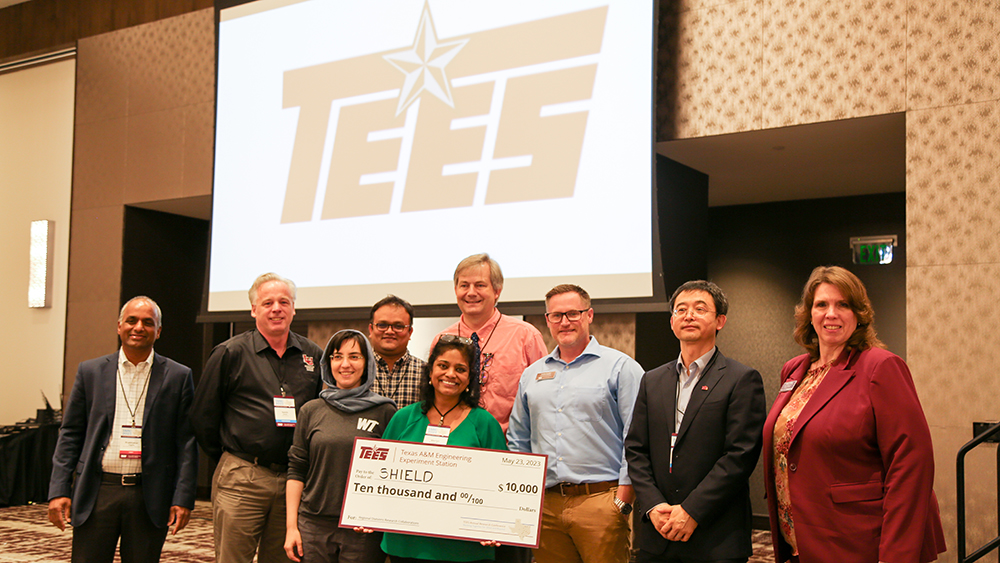
The Texas A&M Engineering Experiment Station (TEES) awarded $30,000 in seed grant funding to new research collaborations at its 2023 TEES Annual Research Conference. First place and $10,000 were awarded to the SHIELD team for their project, “Multi-medium robot smart skin for extreme environmental applications.” Dr. Merlyn Pulikkathara, assistant professor in the physics department at Prairie View A&M University, will serve as the principal investigator.
Each year at the conference, representatives from the 19 TEES regional divisions and affiliates come together to expand the research capacity in the state of Texas by tapping into the talent of the TEES network and forming collaborations that compete for seed funding at the end of each conference. Dr. Cindy Lawley, the Texas A&M University College of Engineering Assistant Vice Chancellor for Academic and Outreach Programs, the Assistant Dean for Engineering Academies and the TEES Associate Agency Director for Workforce Development and Regional Divisions, was chair of this year’s conference, held on the Texas A&M campus at the Texas A&M Hotel and Conference Center.
“The conference provides a unique platform where faculty from TEES regional divisions can come together to share their research projects, ideas and expertise and network with fellow researchers, industry professionals and funding agencies,” Lawley said. “Participants can establish valuable connections, explore potential collaborations and gain insights from experts in their fields, which can lead to new research opportunities and partnerships, fostering innovation and allowing stakeholders to leverage the diverse talent within the TEES network.”
The SHIELD project proposed an innovative smart skin to address the need for protection of electromechanical components in the military, space, emergency response, oil and gas exploration and many other applications. The $10,000 award will allow Pulikkathara and a team of six others from TEES regional division partners to develop a prototype for demonstrating the applicability and effectiveness of the smart skin.
“The key idea is that we will develop and test resilient, protective skin for operation under extreme environments. We will create a prototype test bed with a single-function capability appendage. The robot will be palm-sized and will include smart skin and unskinned controlled versions,” Pulikkathara said. “We will test the prototype with dust x-rays, temperature-controlled gas-phase and liquid-phase chemical exposure, and weight-load testing and impact testing. There will be an initial testing phase of the skin using nanoscale/multi-scale modeling to study its mechanical behavior under these conditions.”
In addition to the prototype, SHIELD hopes to develop a STEM pipeline from their project to encourage underrepresented K-12 students to explore science, technology, engineering and math majors. The team also wants to create potential patents and publications between the team members and their universities to strengthen current and future collaborations.
Team members include Dr. Robert Kelley Bradley, assistant professor of industrial and systems engineering at Lamar University; Justin Carter, senior research engineer in manufacturing initiatives at TEES; R. Gavin Jones, senior director of contracts, grants and industrial partnerships at Lamar University; Dr. Kalyan Raj Kota, senior research engineer in strategic initiatives at TEES; Dr. Masoumeh Ozmaeian, assistant professor of engineering at West Texas A&M University; Dr. Manish Vasoya, postdoctoral researcher in aerospace engineering at TEES; and Dr. Qiang Xu, professor of chemical engineering at Lamar University.
In addition to the $10,000 award, TEES also presented three $5,000 awards and two $2,500 awards at the conference. Visit the TEES Annual Research Conference website for a list of all the award winners.
